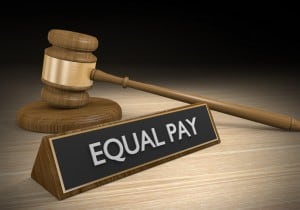 Even in 2018, it’s still a challenge for women to get equal pay for performing the same work as men. It’s often difficult to uncover these disparities due to employer confidentiality, but when employees become aware of wage inequalities, they must have the means to address it. Fortunately, they do, under the Equal Pay Act.
Even in 2018, it’s still a challenge for women to get equal pay for performing the same work as men. It’s often difficult to uncover these disparities due to employer confidentiality, but when employees become aware of wage inequalities, they must have the means to address it. Fortunately, they do, under the Equal Pay Act.
According to the Institute for Women’s Policy Research, in 2016, full-time female workers made 80.5 cents for every dollar earned by men. And at the current rate of change, it will take 41 years for women to reach pay parity with men. No matter the myriad reasons for this wage gap, if you’re female and make less than your male colleagues who perform the same duties, you may have a claim under the Equal Pay Act. There are also rare instances where the Equal Pay Act applies for men.
What is the Equal Pay Act?
President Kennedy signed the Equal Pay Act (EPA) into law in 1963 as an amendment to the Fair Labor Standards Act (FLSA). The Equal Pay Act added provisions to address the wage gap, which the FLSA didn’t adequately address on its own.
When the Act passed in 1963, women’s wages were 59 cents to every dollar earned by men. While the United States workplace is moving toward total wage equality, there is still a need for protection for employees when their employers aren’t providing equitable pay for all.
Do you have a claim under the Equal Pay Act?
Well, if you are being paid unequal wages than employees of the opposite sex, within the same establishment, for equal work on jobs the performance of which requires equal skill, effort and responsibility and are being performed under similar working conditions, maybe so.
Your employer can challenge your claim by providing a reasonable explanation for the pay disparity. One example might be that your coworker has several more years of experience than you, or that they perform more complex day-to-day tasks. However, work doesn’t have to be identical to be equal. Even if your job titles are different, the work can be considered equal if it requires the same skills, responsibilities, and labor under the same conditions and environment.
Based on the circumstances—if there are promotions, hiring, and firing decisions based on gender—you may also have a different legal action under the Civil Rights Act.
If you feel your employer is in violation of the Equal Pay Act, talk to one of the Tennessee employment lawyers at The Gilbert Firm. We have the expertise and knowledge you need when you’re seeking the equal pay to which you’re entitled. If your employment rights have been violated, get in touch with us today. Call Jonathan Bobbitt or Justin Gilbert at 888.996.9731, or fill out our contact form. We have offices in Nashville, Chattanooga, Memphis, Jackson and Knoxville.
 In the courtroom scene of To Kill a Mockingbird, Atticus Finch implores a jury to remember that “there is one way in this country which all men are created equal—there is one human institution that makes a pauper the equal of a Rockefeller, the stupid man equal of an Einstein, and an ignorant man equal of any college president. That institution, gentlemen, is a court.” That concept of equality for all people is deeply ingrained in who we are: as attorneys, as jurists and as citizens. It is the bedrock of our justice system.
In the courtroom scene of To Kill a Mockingbird, Atticus Finch implores a jury to remember that “there is one way in this country which all men are created equal—there is one human institution that makes a pauper the equal of a Rockefeller, the stupid man equal of an Einstein, and an ignorant man equal of any college president. That institution, gentlemen, is a court.” That concept of equality for all people is deeply ingrained in who we are: as attorneys, as jurists and as citizens. It is the bedrock of our justice system. The Equal Pay Act (EPA) is a federal law that protects employee pay rights. The EPA requires that women and men who do equal work receive equal pay, regardless of sex or gender. Whether jobs are equal depends on an analysis as to the equality of the skill, effort and responsibility of the actual job duties and not merely the job title. The duties should be performed under similar working conditions.
The Equal Pay Act (EPA) is a federal law that protects employee pay rights. The EPA requires that women and men who do equal work receive equal pay, regardless of sex or gender. Whether jobs are equal depends on an analysis as to the equality of the skill, effort and responsibility of the actual job duties and not merely the job title. The duties should be performed under similar working conditions.